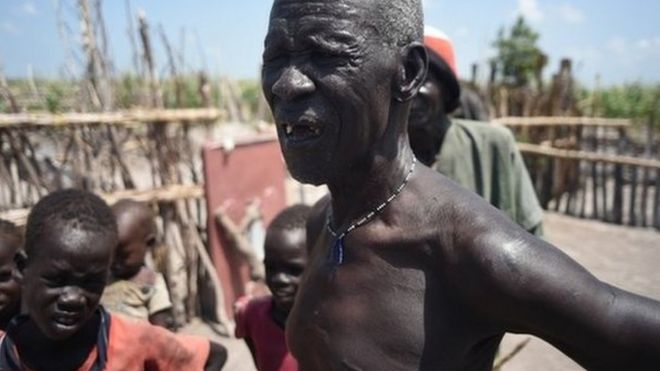A major rebel leader in South Sudan has told the BBC he may have to take up arms again, despite the signing of a peace agreement six weeks ago.
Gen Johnson Oloni said the government was undermining the deal with attacks on civilians and a plan to re-draw state boundaries in the country.
Tens of thousands of people have died and millions have been displaced since the civil war began in 2013.
South Sudan gained independence from neighbouring Sudan four years ago.
'Naked power-grab'
Gen Oloni told the BBC the peace deal was unlikely to work.
He said he was incensed at what he saw as the wrongful occupation of his tribe's land by government forces.
He also said he was angered by a plan - announced earlier this month by President Salva Kiir - to turn South Sudan's 10 states into 28.
Gen Oloni portrayed the move as a naked power-grab, the BBC's Tim Franks reports.
The rebel leader said land appropriations had pushed his tribe to use force in the past and they could do so again.
Many people in the world's youngest country appear weary and traumatised by the war, but few are confident of peace, our correspondent says.
- At least seven ceasefires agreed and broken since conflict started in December 2013
- Nearly one in five South Sudanese displaced by the current conflict, from a total population of 12 million
- Former rebel leader Salva Kiir became president of South Sudan, the world's newest state, when it gained independence in 2011
- South Sudan has been at war for 42 of past 60 years
The conflict erupted in December 2013 after Mr Kiir accused Riek Machar, his sacked deputy, of plotting a coup.
Mr Machar denied the allegation, but then formed a rebel army.
Much of the fighting has been carried out along ethnic lines, between Mr Machar's Nuer group and Mr Kiir's Dinka, the two dominant ethnic groups in South Sudan.

 Stay Updated And Connected With sofogist.Com Daily..
Stay Updated And Connected With sofogist.Com Daily.. 





